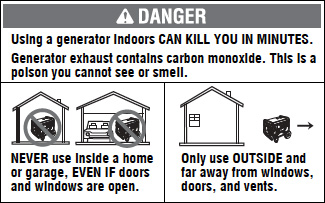This information is not a substitute for reading the operator's manual. To reduce the risk of injury or death, you must read and understand the operator's manual for your generator before using it.
This information is not a substitute for reading the operator's manual. To reduce the risk of injury or death, you must read and understand the operator's manual for your generator before using it.
Using a generator indoors CAN KILL YOU IN MINUTES. Generator exhaust contains high levels of carbon monoxide (CO), a poisonous gas you cannot see or smell. If you can smell the generator exhaust, you are breathing CO. But even if you cannot smell the exhaust, you could be breathing CO.


Even when you use a generator correctly, CO may leak into the home. ALWAYS use a battery-powered or battery-backup CO alarm in the home. If you start to feel sick, dizzy, or weak after the generator has been running, move to fresh air RIGHT AWAY. See a doctor. You could have carbon monoxide poisoning.
For more information regarding the risk of exposure to carbon monoxide, visit the US Consumer Product Safety Commission website at http://www.cpsc.gov/info/co/generators.html.
For more information regarding the safe use of portable generators, visit the Portable Generator Manufacturer’s Association Website at http://www.pgmaonline.com/default.asp.